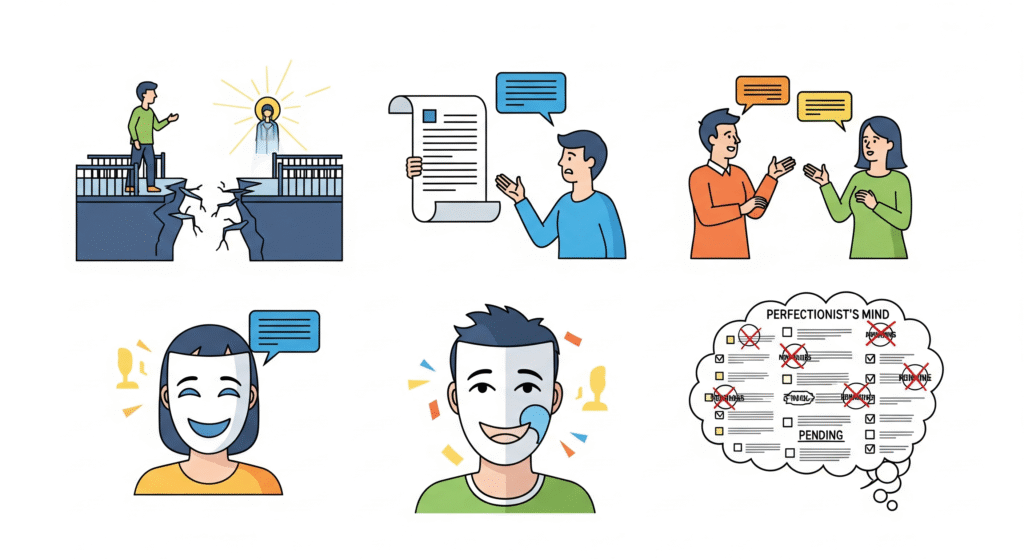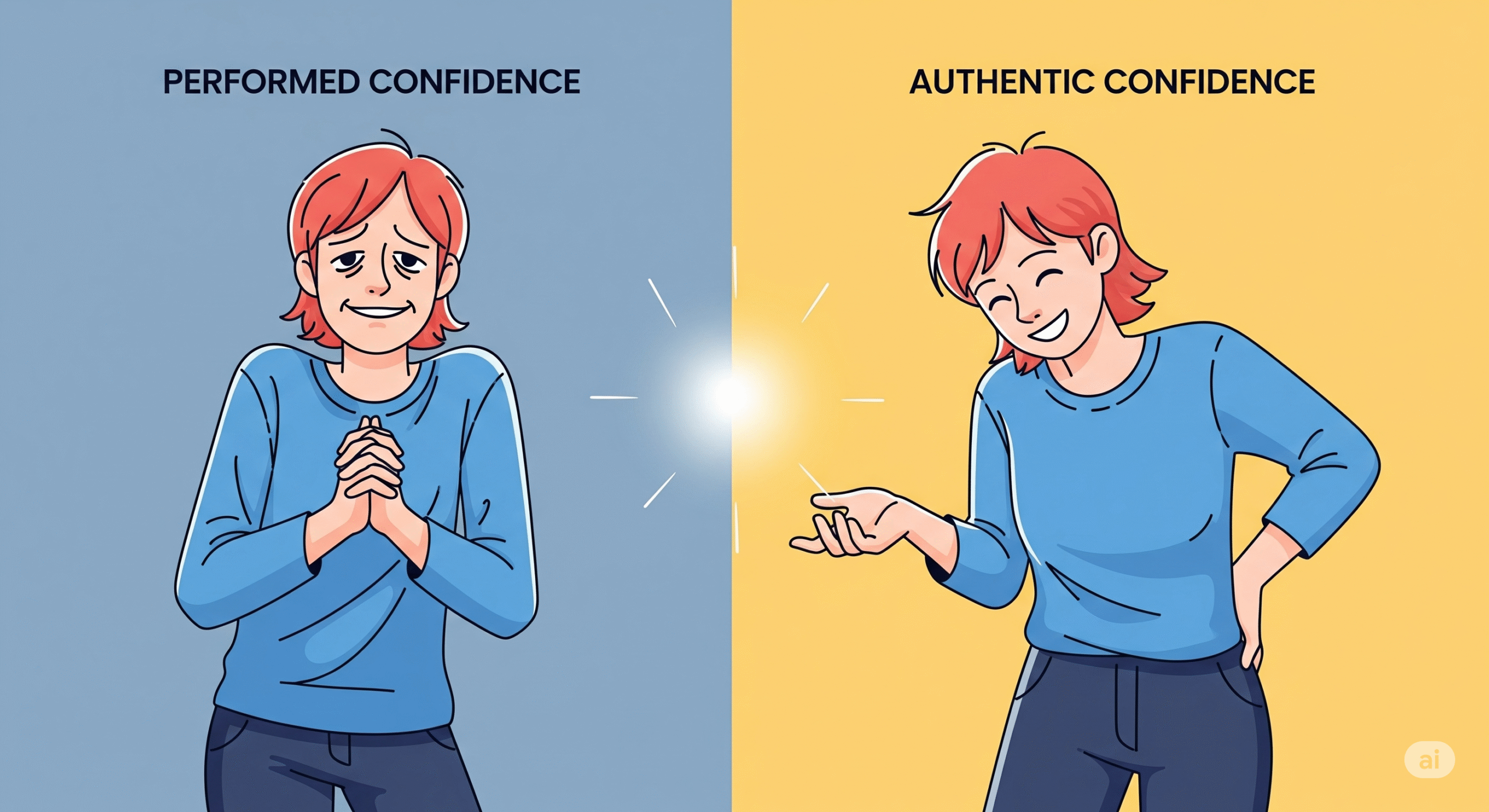Every conversation feels like an Oscar-worthy performance where you’re the only one who knows you’re acting.
You walk into that networking event with your shoulders back and a practised smile. You make eye contact, deliver your elevator pitch flawlessly, and even manage a few well-timed jokes. From the outside, you look like someone who has their life together—confident, charismatic, completely at ease.
But inside? You’re running a constant mental commentary: “Did that sound stupid? Are they buying this? How much longer do I have to keep this up?” You feel like a fraud wearing a confidence costume that might slip off at any moment.
Maybe it’s during first dates when you find yourself performing an idealized version of yourself. Or perhaps it’s in work meetings where you speak up with authority while secretly questioning every word. This mental spiral is similar to what happens when you overthink every little thing in social situations. a common experience for those dealing with imposter syndrome in professional settings. You might even catch yourself faking confidence in conversations with friends, family members, or even strangers at the coffee shop.
Here’s what’s wild about faking confidence in conversations—almost everyone does it, but nobody talks about it. We’re all walking around thinking we’re the only ones who don’t have this social thing figured out, when in reality, most people are improvising their way through interactions just like you are.
The difference between people who seem naturally confident and those who feel like they’re constantly performing isn’t what you think. It’s not that some people are born with an endless supply of social ease while others are doomed to fake it forever. The real difference lies in understanding why we feel compelled to perform confidence instead of developing it authentically.
In this article, we’ll explore the psychology behind why faking confidence in conversations feels so necessary, dive into the science of social anxiety and the spotlight effect, and most importantly, give you seven practical strategies for building genuine social confidence that doesn’t require a performance. By the end, you’ll understand that feeling authentic in conversations isn’t about never being nervous—it’s about being nervous and showing up anyway.
The Day I Realised Everyone Thinks I’m Confident (Plot Twist: I Don’t)

Last year, I attended my college reunion feeling like I was about to perform in the world’s most important improv show. I’d spent weeks mentally rehearsing conversations, practising anecdotes about my career, and crafting the perfect balance of humility and success for my “life update” summary.
The reunion went exactly as planned. I worked the room, reconnected with old friends, made new connections, and even gave an impromptu toast that got genuine laughs. People kept commenting on how confident I seemed, how put-together my life appeared, how naturally I commanded conversations.
Then Sarah, my former roommate, pulled me aside during a quiet moment. “I’ve always envied how effortlessly confident you are,” she said. “Even in college, you just seemed to have this natural social ease that I wished I could learn.”
I almost choked on my drink. This was the same Sarah whom I’d always thought was the epitome of cool confidence. While I was agonising over every social interaction, she seemed to glide through parties and presentations without a care in the world. And here she was, telling me she’d been envying my confidence for years.
That night, I started reaching out to other classmates with a simple question: “On a scale of 1-10, how confident do you actually feel in social situations?” The responses were eye-opening. People I’d always considered social butterflies confessed to detailed pre-conversation scripts. The guy who seemed to own every room admitted to practising his stories in the car before events. The woman who I thought could talk to anyone revealed she often felt like she was “performing confidence” rather than feeling it.
It hit me that night—we’re all performing to some degree. The difference isn’t between confident people and anxious people. It’s between people who’ve learned to perform authentically and those who exhaust themselves trying to maintain a perfect facade.
That realisation changed everything about how I approach conversations. Instead of trying to eliminate the performance aspect entirely, I started focusing on making my performance more authentic, more sustainable, and ultimately more genuine.
The Science Behind Social Confidence Masking

What I experienced at that reunion isn’t unusual—it’s actually backed by decades of psychological research. The gap between how we feel internally and how others perceive us is one of the most consistent findings in social psychology.
The spotlight effect, first studied extensively by researchers at Cornell University, explains why we feel like we’re constantly being watched and judged in social situations. We assume others are paying much more attention to our behaviour, appearance, and words than they actually are. This creates a heightened sense of self-consciousness that makes authentic interaction feel risky.
According to the Anxiety and Depression Association of America, social anxiety affects 15 million adults in the United States—that’s 7.1% of the population. But here’s the kicker: studies show that even people without clinical social anxiety report feeling like they’re “faking it” in social situations up to 40% of the time.
Stanford Psychology research on confidence versus competence reveals something fascinating: there’s often very little correlation between how confident someone feels internally and how confident they appear to others. The study found that people consistently underestimate their own social competence while overestimating others’. This creates what researchers call “the confidence illusion”—we think everyone else has figured out something we haven’t.
Dr. Amy Cuddy’s research on “power posing” showed that sometimes the physical act of confidence can actually create the internal feeling, but it also revealed something equally important: the most sustainable confidence comes from alignment between our internal state and external expression, not from pure performance.
Perhaps most importantly, research from Harvard’s social anxiety lab demonstrates that people who report the highest levels of authentic confidence aren’t those who never feel nervous—they’re those who’ve learned to be nervous and genuine simultaneously. They’ve stopped equating confidence with the absence of anxiety and started understanding it as the presence of authenticity despite anxiety.
This research helps explain why faking confidence in conversations feels so exhausting. When there’s a constant disconnect between how we feel and how we’re acting, it creates what psychologists call “emotional labor”—the mental effort required to manage our emotional expression. The goal isn’t to eliminate this entirely, but to reduce the gap between our authentic selves and our social presentation.
4 Reasons We Fake Confidence Instead of Building It

Understanding why we default to performing confidence rather than developing it is crucial for breaking the cycle. Through my research and conversations with hundreds of people about their social experiences, I’ve identified four primary patterns that keep us stuck in the performance trap.
The Competence-Confidence Gap
This is the most common reason people end up faking confidence in conversations. You know you’re capable—you’re intelligent, you have valuable insights, you’ve achieved things you’re proud of. But knowing something intellectually and feeling it emotionally are completely different experiences.
The competence-confidence gap explains why a surgeon can perform life-saving operations with steady hands but feel nervous introducing themselves at a hospital fundraiser. Or why a brilliant software engineer can debug complex systems but stumble through small talk at team lunches. Competence in one area doesn’t automatically translate to confidence in social situations.
This gap creates a frustrating cycle: because you know you’re capable, you feel like you should be confident. When you’re not, you assume there’s something wrong with you, so you compensate by performing the confidence you think you should have. The performance works well enough that people see you as confident, which reinforces the pressure to maintain the act.
Social Script Dependency
Many of us have become overly reliant on social scripts—predetermined responses and conversation patterns that feel safe and predictable. While scripts can be helpful, dependency on them creates a confidence house of cards that collapses the moment someone goes off-script.
I once watched a networking expert completely freeze when someone asked him an unexpected personal question during his own workshop. He was so used to following his practised conversation flow that he couldn’t adapt when the interaction took an unplanned turn. His confidence was entirely dependent on external structure rather than internal flexibility.
Social script dependency develops because scripts work—they help us navigate conversations successfully and receive positive feedback. But they also prevent us from developing genuine conversational confidence because we never learn to trust our authentic responses. We become like actors who can only perform with a script, never learning to improvise.
Authenticity Fear in Social Settings
This might seem counterintuitive, but many people are genuinely afraid of being authentic in conversations because they believe their real selves aren’t interesting, likeable, or valuable enough. So instead of risking rejection of their authentic selves, they create and perform a “social self” that feels safer to share.
The problem with this strategy is that it creates an impossible standard. If people like your performed self, you feel like they don’t really know you. If they don’t like your performed self, you feel like even your best version isn’t good enough. Either way, you end up feeling disconnected and inauthentic.
This fear often stems from past experiences where authenticity was met with rejection, criticism, or indifference. Maybe you shared something genuine and were ignored or misunderstood. Maybe you were vulnerable and got hurt. So your brain learned that performing is safer than being real.
Perfectionism in Communication
Social perfectionists believe they should always say the right thing, at the right time, in the right way. They think confident people never stumble over words, never have awkward pauses, never misread social cues. This perfectionist standard makes genuine conversation feel incredibly risky because there’s no room for the natural messiness of human interaction.
Perfectionism in communication creates a hypervigilant state where you’re constantly monitoring and editing yourself instead of engaging naturally. You end up having conversations with your internal critic instead of with the person in front of you. Every word is filtered through questions like “Is this smart enough? Funny enough? Appropriate enough?”
The irony is that this perfectionist approach often makes conversations less engaging, not more. When you’re focused on saying everything perfectly, you miss opportunities for genuine connection, spontaneous humor, and authentic exchange.
7 Ways to Build Genuine Social Confidence

Now let’s talk about moving from performed confidence to authentic confidence. These strategies aren’t about eliminating nerves or becoming a different person—they’re about becoming more genuinely yourself in social situations.
The Preparation-Without-Scripting Method
The key is preparing your mindset and energy rather than your exact words. Before important conversations, instead of rehearsing specific lines, focus on reminding yourself of your values, your genuine interest in others, and your authentic perspective on relevant topics.
For example, before a networking event, rather than practicing your elevator pitch word-for-word, spend time thinking about what you’re genuinely curious about in your field, what challenges you’re authentically facing, and what insights you’ve gained that might actually help others. This gives you a foundation of authenticity to draw from rather than a script to recite.
This method works because it prepares your authentic self to show up rather than training you to perform a character. You’ll still feel prepared and confident, but in a way that allows for genuine interaction and spontaneous connection.
Vulnerability as Strength Practice
Start small with this one, but begin incorporating appropriate vulnerability into your conversations. This doesn’t mean oversharing or treating every interaction like therapy—it means allowing your genuine humanity to show through.
Instead of always presenting your successes, occasionally mention your learning curves. Instead of pretending everything is perfect, acknowledge when you’re figuring things out. Instead of having an opinion on everything, admit when you’re genuinely unsure or curious about something.
Vulnerability builds authentic confidence because it removes the pressure to be perfect. When you accept that you’re human and allow others to see that humanity, conversations become infinitely more relaxed and genuine.
Active Listening Over Performance
Shift your focus from how you’re coming across to genuine curiosity about the other person. This is perhaps the most transformative strategy because it moves your attention away from self-monitoring and toward authentic engagement.
When you’re truly listening—not just waiting for your turn to speak or thinking about how to respond—you naturally become more present, more responsive, and more confident. Good listeners appear confident because they’re not consumed with anxiety about their own performance.
Practice asking follow-up questions that show you’ve actually heard what someone said. Notice details about their responses that genuinely interest you. Developing these active listening skills can transform your confidence in any social interaction.”. Allow their energy and enthusiasm to influence your own rather than trying to maintain a predetermined persona.
Energy Matching Techniques
Learn to read and authentically match the energy of your conversation partner rather than maintaining the same performed energy level regardless of context. Confident people are adaptable—they can be enthusiastic with enthusiastic people and calm with calm people.
This doesn’t mean becoming a chameleon or losing your authentic self. It means recognizing that authentic confidence is responsive and flexible. A confident person speaks differently with their grandmother than with their college friends, not because they’re being fake, but because they’re being appropriately authentic to the context.
Energy matching builds genuine confidence because it gets you out of your head and into relationship with the actual person in front of you. It’s impossible to be genuinely connected and completely anxious at the same time.
Recovery Phrases for Stumbles
Develop a few authentic ways to recover when conversations don’t go as planned. The goal isn’t to avoid all social stumbles—it’s to handle them with grace and authenticity when they happen.
Simple phrases like “Let me try that again” or “I’m not explaining this well” or even “I’m nervous and rambling a bit” can completely transform an awkward moment into a human connection. Confident people aren’t people who never mess up—they’re people who handle mistakes with authenticity and humor.
Having these recovery phrases in your back pocket builds confidence because you know you can handle imperfection gracefully. This reduces the pressure to be perfect, which paradoxically makes you more naturally confident.
Post-Conversation Reflection Ritual
Instead of immediately criticising yourself after social interactions, develop a balanced reflection practice. Ask yourself three questions: What went well? What would I do differently? What did I learn about the other person? This mindful approach can also help if you often find yourself wondering why time feels like it’s passing too fast during stressful social interactions.
This practice builds confidence over time because it helps you recognize your social growth and strengths rather than focusing only on perceived failures. It also helps you learn from experiences in a constructive way rather than just replaying embarrassing moments.
Keep a small journal or note in your phone about positive social interactions. Over time, you’ll build evidence that you are capable of genuine, confident conversation, which makes future interactions feel less daunting.
Progressive Social Challenges
Gradually expose yourself to slightly uncomfortable social situations in a supportive way. Start with low-stakes interactions and work your way up to more challenging conversations.
This might mean asking a question in a small meeting before speaking up in a large presentation, or having one genuine conversation at a party before working a room. The key is building authentic confidence through positive experiences rather than throwing yourself into situations that feel overwhelming.
Each positive experience builds genuine confidence because you’re proving to yourself that you can handle social challenges authentically. This creates an upward spiral where confidence leads to better interactions, which builds more confidence.
Fake vs. Authentic Confidence Signals
Learning to recognize the difference between performed and genuine confidence can help you shift toward more authentic interactions. Here’s what to look for:

| Energised by authentic exchanges | Authentic Confidence |
| Over-talking to fill silence | Comfortable with natural pauses |
| Rigid, rehearsed body language | Relaxed, adaptive posture |
| Seeking validation constantly | Contributing value naturally |
| Same energy regardless of context | Responsive to situation and people |
| Perfect responses to everything | Admits uncertainty when genuine |
| Avoids showing any vulnerability | Shares appropriate humanity |
| Focuses on impression management | Focuses on genuine connection |
| Exhausted after social interactions | Energized by authentic exchanges |
The most telling difference is sustainability. Fake confidence is exhausting because it requires constant mental effort to maintain a performance. Authentic confidence is renewable because it’s based on being yourself rather than acting like someone else.
Authentic confidence also allows for growth and learning. When you’re performing confidence, mistakes feel catastrophic because they threaten your act. When you’re genuinely confident, mistakes become information that helps you improve and connect more authentically with others.
Notice that authentic confidence doesn’t mean never feeling nervous or uncertain. It means feeling nervous and uncertain while still showing up as yourself. It’s confidence despite anxiety, not confidence instead of anxiety.
Your Permission Slip to Be Imperfectly Authentic

Remember that performance metaphor from the beginning—how every conversation feels like an Oscar-worthy acting job? Here’s the plot twist: everyone else is improvising too.
Life is essentially one giant improv show where nobody has the script and everyone is making it up as they go along. The people who seem most confident aren’t the ones who have it all figured out—they’re the ones who’ve gotten comfortable with the improvisation.
Think about the most confident people you know personally. I bet if you really consider it, their confidence doesn’t come from being perfect or always knowing what to say. It comes from being authentically themselves, even when that self is uncertain, nervous, or still learning.
The goal isn’t to eliminate the performance aspect of social interaction entirely—we all adapt our communication style depending on context, and that’s healthy. The goal is to make your performance more authentic, more sustainable, and more aligned with who you really are.
You have permission to be nervous and show up anyway. You have permission to not have all the answers. You have permission to stumble over words, to take pauses to think, to ask clarifying questions, to admit when you don’t know something.
Most importantly, you have permission to stop auditioning for approval in every conversation and start engaging as your genuine self. The people worth knowing will appreciate your authenticity far more than your performance.
Your confidence doesn’t have to be perfect to be real. It just has to be yours.
Expert Insights:
Anxiety and Depression Association of America
Harvard social anxiety research
Drop a 🎭 if you’ve ever felt like you’re acting confident. Let’s be real about this together!

